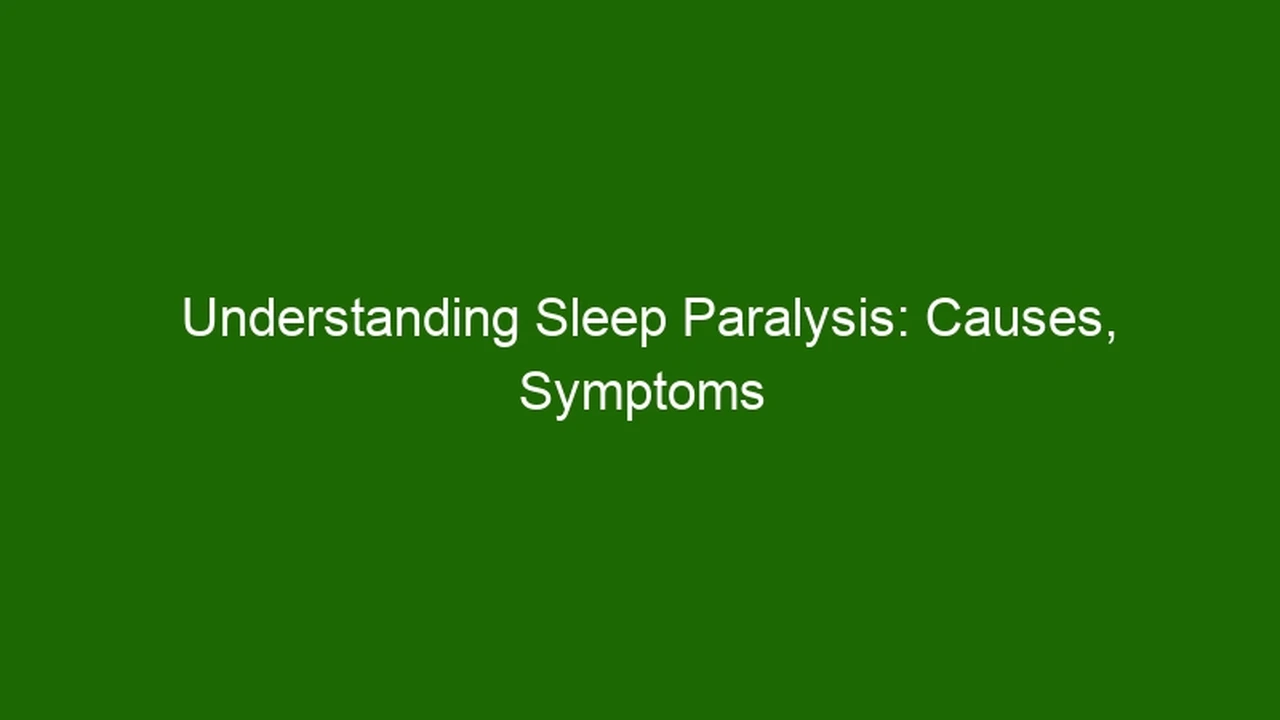Sleep and Eating Disorders: A Dangerous Combination
Sample meta description.

Understanding the Intertwined Nature of Sleep Eating Disorders and Mental Health
Hey there! Ever feel like your sleep and eating habits are locked in a bizarre, unhealthy dance? You're not alone. Sleep and eating disorders often waltz together, creating a complex and sometimes dangerous situation. We're going to break down why this happens and what you can do about it. Think of this as your friendly guide to untangling this mess, no medical jargon guaranteed (well, mostly!).
First things first, let's be real: sleep and food are fundamental to our well-being. When either goes off the rails, the other often follows. Sleep deprivation messes with our hormones, making us crave sugary, fatty foods. Eating disorders, on the other hand, can disrupt sleep patterns, leading to insomnia, nightmares, or even sleepwalking. It's a vicious cycle!
The Sleep Eating Disorder Connection Exploring the Vicious Cycle
So, what exactly links these two seemingly different issues? Let’s dive deeper:
- Hormonal Havoc: Lack of sleep throws your hormones like ghrelin (the hunger hormone) and leptin (the satiety hormone) out of whack. This can lead to increased cravings and overeating, especially late at night.
- Emotional Eating: Eating disorders are often rooted in emotional distress. Sleep deprivation can exacerbate these emotions, leading to comfort eating or binge eating.
- Circadian Rhythm Disruption: Eating at irregular times, common in many eating disorders, can mess with your body's natural sleep-wake cycle (circadian rhythm). This makes it harder to fall asleep and stay asleep.
- Mental Health Factors: Anxiety, depression, and other mental health conditions often co-occur with both sleep and eating disorders. These conditions can worsen both sleep and eating problems.
Think of it like this: imagine your brain is a control center. Sleep deprivation is like throwing a wrench into the gears, disrupting its ability to regulate hunger, emotions, and sleep patterns. Eating disorders add fuel to the fire, creating a chaotic mess. Not fun, right?
Specific Sleep Disorders Linked to Eating Disorders Identifying the Culprits
Several sleep disorders are frequently observed alongside eating disorders. Let's take a look at some of the most common ones:
- Insomnia: Difficulty falling asleep or staying asleep. This is a big one! Stress, anxiety, and irregular eating patterns can all contribute to insomnia.
- Night Eating Syndrome (NES): Characterized by recurrent episodes of night eating, often without full awareness. People with NES may consume a significant portion of their daily calories after dinner.
- Sleep-Related Eating Disorder (SRED): Similar to NES, but individuals with SRED are often completely unaware of their eating episodes. They may eat unusual or even dangerous things while sleepwalking.
- Restless Legs Syndrome (RLS): An irresistible urge to move the legs, often accompanied by uncomfortable sensations. RLS can make it difficult to fall asleep and stay asleep.
- Sleep Apnea: A condition in which breathing repeatedly stops and starts during sleep. Sleep apnea can disrupt sleep and lead to daytime fatigue.
Recognizing these connections is crucial for effective treatment. If you suspect you might have both a sleep disorder and an eating disorder, it's important to seek professional help.
Products to Promote Better Sleep When Dealing With Eating Disorders Recommendations and Comparisons
Okay, let's talk solutions! While professional help is essential, there are also some products that can help improve your sleep quality. Remember, these are tools to support your overall treatment plan, not replacements for it.
Weighted Blankets The Comforting Embrace
Weighted blankets provide deep pressure stimulation, which can help reduce anxiety and promote relaxation. They're like a gentle hug all night long!
- Product Recommendation: Gravity Blanket
- Usage Scenario: Use it while sleeping to reduce anxiety and improve sleep quality.
- Pros: High-quality materials, even weight distribution.
- Cons: Can be expensive, may be too heavy for some individuals.
- Price: Around $250.
- Alternative: YnM Weighted Blanket - A more affordable option with a wide range of sizes and weights. Price: Around $80-$150 depending on size and weight.
- Comparison: Gravity Blanket is known for its premium quality and even weight distribution, while YnM offers a more budget-friendly option. Consider your budget and desired level of quality when choosing.
White Noise Machines Masking Distracting Sounds
White noise machines create a consistent, soothing sound that can mask distracting noises and help you fall asleep faster.
- Product Recommendation: LectroFan White Noise Machine
- Usage Scenario: Use it in your bedroom to block out distracting noises and create a calming sleep environment.
- Pros: Wide range of sounds, adjustable volume.
- Cons: Some users may find the sounds repetitive.
- Price: Around $50.
- Alternative: Marpac Dohm Classic White Noise Machine - A simpler, analog option with a fan-based sound. Price: Around $50.
- Comparison: LectroFan offers a wider range of digital sounds, while Marpac Dohm provides a more natural, fan-based sound. Consider your preference for sound type when choosing.
Sleep Masks Blocking Out Light
Sleep masks block out light, which can help regulate your body's natural sleep-wake cycle and improve sleep quality.
- Product Recommendation: Manta Sleep Mask
- Usage Scenario: Use it while sleeping to block out light and create a dark, sleep-conducive environment.
- Pros: Fully adjustable, comfortable fit.
- Cons: Can be expensive.
- Price: Around $35.
- Alternative: Alaska Bear Natural Silk Sleep Mask - A more affordable option made from silk. Price: Around $10.
- Comparison: Manta Sleep Mask offers a highly customizable fit and complete light blockage, while Alaska Bear provides a comfortable and affordable silk option. Consider your budget and desired level of customization when choosing.
Essential Oil Diffusers Creating a Relaxing Atmosphere
Essential oil diffusers can create a relaxing atmosphere by dispersing calming scents like lavender and chamomile into the air.
- Product Recommendation: InnoGear Essential Oil Diffuser
- Usage Scenario: Use it in your bedroom to create a relaxing and calming atmosphere before bed.
- Pros: Affordable, easy to use.
- Cons: May not be as effective as higher-end diffusers.
- Price: Around $20.
- Alternative: Vitruvi Stone Diffuser - A more stylish and high-end option. Price: Around $120.
- Comparison: InnoGear is a great budget-friendly option, while Vitruvi offers a more aesthetically pleasing design and potentially better performance. Consider your budget and aesthetic preferences when choosing.
Melatonin Supplements Aiding Sleep Onset
Melatonin supplements can help regulate your sleep-wake cycle and make it easier to fall asleep. Important Note: Consult with a doctor or therapist before taking melatonin, especially if you have an eating disorder. They can help determine if it's safe and appropriate for you.
- Product Recommendation: Natrol Melatonin Fast Dissolve Tablets
- Usage Scenario: Take it 30 minutes before bed to help you fall asleep.
- Pros: Fast-dissolving, easy to take.
- Cons: May cause drowsiness.
- Price: Around $10.
- Alternative: Nature Made Melatonin Tablets - A more widely available and trusted brand. Price: Around $8.
- Comparison: Both are reputable brands, so choose based on personal preference and availability. Again, talk to your doctor first!
Practical Tips for Improving Sleep Quality When Struggling With Eating Disorders Implementing Healthy Habits
Beyond products, lifestyle changes are key to improving sleep quality. Here are some practical tips:
- Establish a Regular Sleep Schedule: Go to bed and wake up at the same time every day, even on weekends. This helps regulate your body's natural sleep-wake cycle.
- Create a Relaxing Bedtime Routine: Wind down before bed with relaxing activities like reading, taking a warm bath, or listening to calming music.
- Avoid Caffeine and Alcohol Before Bed: These substances can interfere with sleep.
- Create a Sleep-Conducive Environment: Make sure your bedroom is dark, quiet, and cool.
- Practice Relaxation Techniques: Try deep breathing exercises, meditation, or progressive muscle relaxation to calm your mind and body before bed.
- Be Mindful of Meal Timing: Avoid eating large meals or sugary snacks close to bedtime. Work with your therapist or nutritionist to determine a healthy and consistent eating schedule.
- Address Underlying Mental Health Issues: Seek therapy or counseling to address anxiety, depression, or other mental health conditions that may be contributing to your sleep and eating problems.
Seeking Professional Help The Importance of Therapy and Medical Guidance
Let's be clear: dealing with sleep and eating disorders is tough. It's crucial to seek professional help from therapists, doctors, and registered dietitians. They can provide personalized treatment plans and support you on your journey to recovery.
Therapy can help you address the underlying emotional and psychological issues that contribute to both sleep and eating disorders. Medical professionals can assess your physical health and recommend appropriate medical interventions. Registered dietitians can help you develop a healthy and balanced eating plan.
Remember, you're not alone in this. Reaching out for help is a sign of strength, not weakness. Take the first step today and start your journey towards better sleep and a healthier relationship with food.
So there you have it! A deep dive into the complex world of sleep and eating disorders, along with some practical tips and product recommendations to help you get a better night's sleep. Remember to always prioritize your health and well-being, and don't hesitate to seek professional help when needed. Sweet dreams!
:max_bytes(150000):strip_icc()/277019-baked-pork-chops-with-cream-of-mushroom-soup-DDMFS-beauty-4x3-BG-7505-5762b731cf30447d9cbbbbbf387beafa.jpg)






